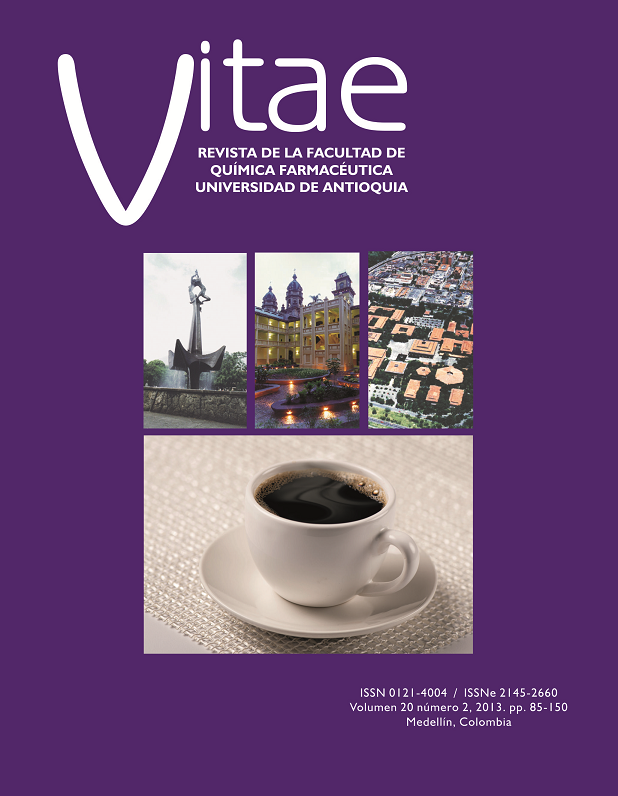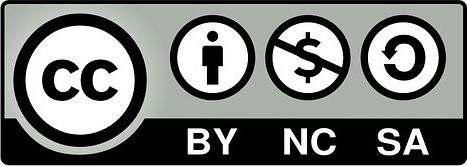Hepatoprotective effect of calyces extract of Physalis peruviana in hepatotoxicity induced by CCl4 in wistar rats
DOI:
https://doi.org/10.17533/udea.vitae.12560Keywords:
Physalys peruviana, hepatotoxicity, oxidative stress, antioxidant.Abstract
Background: Physalis peruviana (“uchuva”, Solanaceae) is a widespread species of the South American Andes and widely used in traditional medicine. Its fruits are consumed as food and for the treatment of diabetes. The juice of Physalis peruviana fruits is topically applied in the eyes for pterigyum treatment. Previous works reported that the fruit extracts has modulating activity of oxidative stress in experimental diabetes models induced by streptozotocin. It has been attributed antipyretic, antimicrobial, analgesic and anti-inflammatory properties to the calyces enveloping the fruit. Reported literature demonstrates in vivo and in vitro that different calyx’s extracts have antioxidant and anti-inflammatory activities. Objectives: To evaluate the in vivo hepatoprotective effect of the extract of Physalis peruviana calyces, involving inflammation and oxidative stress models at hepatic level. Methods: Hepatotoxicity was induced by single oral administration of CCl4 (2 mL / Kg in olive oil) in Wistar rats. Physalis peruviana extract (250 mg/Kg) and silymarin (200 mg/Kg), used as control drug, were administrated twice a day for five days. At the end of the experiment, animals were euthanized and the liver enzymes alanine aminotransferase, aspartate aminotransferase, and alkaline phosphatase were measured as well as some parameters of hepatic antioxidant status like superoxide dismutase and catalase activities, protein oxidation and lipid peroxidation. Results: Extract of Physalis peruviana calyces inhibited significantly (p < 0.001) liver oxidative stress caused by CCl4, maintaining superoxide dismutase and catalase activities close to normal. Studied extract also reduced significantly liver enzymes levels increased by CCl4 administration. Conclusion: It was suggested that the extract of Physalis peruviana calyces presents a hepatoprotective effect related to its antioxidant activity, especially regarding to lipid peroxidation inhibition.Downloads
Downloads
Published
How to Cite
Issue
Section
License
Copyright Notice and Open Access Statement
The Journal Vitae works under the Open Access license, and the published manuscripts remain available for the public, both on the Journal's website and in databases, under the Creative Commons license, "Noncommercial Attribution" and "Share alike" systems, adopted in Colombia. Hence, when the authors agree to publish in the Journal Vitae, they will not have the right to economic retributions on publications and reproductions through different diffusion media. The documents are freely available to the internet public, permitting users to read, download, copy, distribute, print, search, or link to the full texts and pass them as data to software. The only constraint on reproduction and distribution, should be to give authors control over the integrity of their work and the right to be appropriately acknowledged and cited.
Authors declare that:
-
They are the intellectual property owners and are responsible for all the information stated in the article.
-
This manuscript has not been submitted or published in other printed or digital media. They accept the responsibility for the judgments, opinions, and points of view expressed in the published article and, therefore, they exonerate Universidad de Antioquia and Journal Vitae from any process.
-
They exempt Universidad de Antioquia and Journal Vitae from settling conflicts or disputes related to the authorship of the referred article.
-
They accept the revision of the original manuscript by suitable personnel, and they bind themselves to perform the corrections appointed or suggested by the assessors.
-
Therefore, they know the editorial process and will not bind the Editorial Board of the Journal to assume any obligations regarding the volume and issue in which the article is published.
-
They transfer the rights of publication, reprinting, and distribution of the article from the moment of its approval, in print and digital format, without the right to economic rewards, and under the licensing conditions considered relevant by Journal Vitae.
-
They fully authorize Universidad de Antioquia and Journal Vitae to submit the published material to the diverse databases and indexing systems where the Journal can be found to comply with the requirements of the regulatory authorities to maintain the national classification of journals.
-
They will assume the article publication costs established for the current issue, and they will make the payment as soon as they are informed about the volume and the issue in which the final version of the article is published.
-
After the article is published, you can share digital or printed copies in a noncommercial manner. You will be able to use the paper in your institution or company for educational or research purposes, including the use in course programs.
Conflict of interest: Authors are responsible for recognizing and disclosing any financial or other benefits that could be perceived to bias their work, acknowledging all financial support and any personal connections with potential sponsors. Examples of such conflicts include receiving research funds or honoraria, serving on advisory boards, stock ownership, or employment and consulting arrangements. Authors without such connections should clearly state that they have no financial support or personal relationships that could be perceived to bias their work. All conflicts of interest should be disclosed on the author's identification page of the manuscript.










